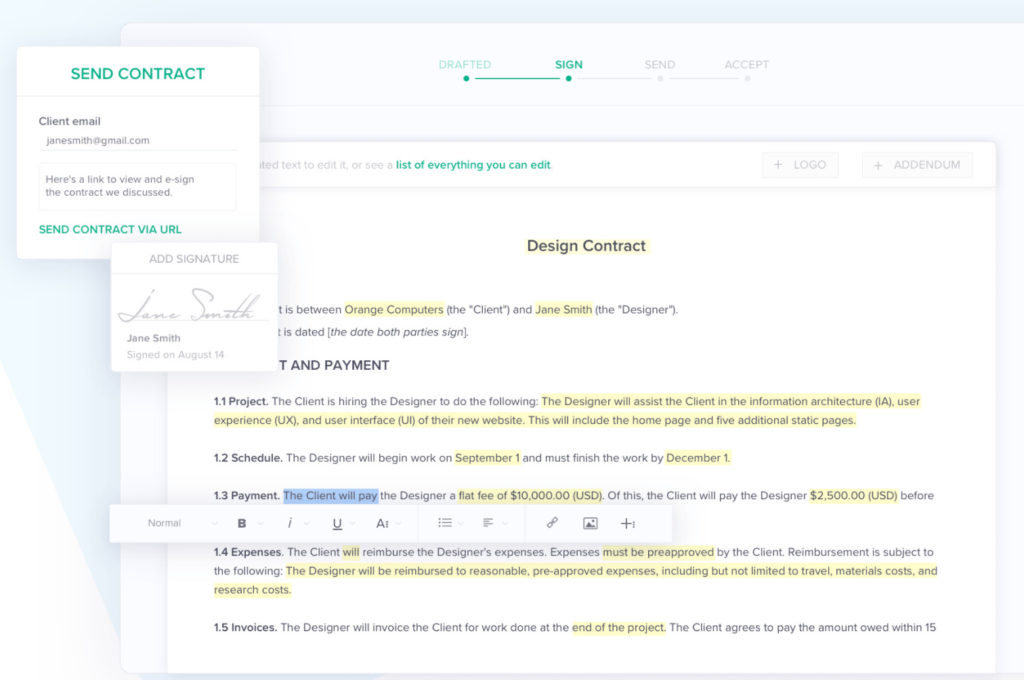Employment contracts are essential for any business who wants to protect themselves and their employees legally. They are used in most organizations nowadays and there are many benefits to having them in place.
However, if you’ve not yet employed anyone within the organization, you might have little knowledge of employment contracts and how to create one. With that being said, this article will explain what employment contracts are and how to nail it for your business.
What is an employment contract?
An employment contract is a legal agreement between an employer and the employee. Regardless of whether that employee is a full-time staff member or a contracted one, every staff member needs this contract in place.
This contract is often drafted up before the employee officially starts and is an agreement that details the relationship, the job requirements and any other relevant information that is deemed appropriate. By having both parties sign this agreement, it means that any breach would fall to either party responsible for the breach itself.
Any employment contract is the core foundation of a relationship between the employer and employee. Without it, there’s certainly a lot that could go wrong as a result.
A survey conducted by the Team found that out of 33,000 individuals in 2019 on a global scale, 75% of people trust their employer to do what is right. An employment contract is part of this trust that the two parties build.
How to create a successful contract
Depending on the employee being hired, it might affect the information or type of contract that you offer. In general, an employment contract will feature the same information in relation to the role and information pertaining to the employer themselves.
In order to create a successful contract, it’s important to know how to structure the document and what needs including. The following information is detailed in order, so be sure to structure it as such.
Names
This is the first section of your employment contract and will outline the employee name, employer, any department heads or managers that will be directly above the staff member in question.
Details like this, although basic, are important to get right because it’s legally confirming the names of the parties involved. Simple spelling mistakes could make this contract invalid.
Employment duration
If it’s a permanent, full-time job role, then there won’t be an end date needed. However, you’ll want to put in an official start date. For contracted or temp roles, there will be a set duration that needs to be written into the contract.
Be sure to discuss this with the employee to make sure the duration is correct.
Workplace details
Workplace details are important because it defines what environment this contract is legal under. There might need to be some changes when the work environment changes whether it be temporary or permanent.
Working hours and probationary period
Outlining the working hours is necessary because there might be a need for overtime mentioned also. This is also where the probationary period will go and often varies depending on the job role or company. Typically a probationary period is three months long but this can often be longer or shorter.
Working hours are critical to put into this document, so again make sure the discussion of working hours is agreed. Both parties should be happy with the working hours outlined.

Salary deductions and employee expenses
There may be occasions where deductions are needed and these will be defined in this section. Employee expenses are also part and parcel of an employment contract, although you may want to explain these in more detail with a separate document.
Employee expenses can be summarised briefly and then referenced to another document or platform. Some businesses use perk and benefit platforms where staff have logins to access their perks.
Holiday and sickness entitlements
Holiday and sickness entitlements are mentioned in this contract. This should also refer to paternity/maternity leave too. Again, this might differ depending on the type of employee you’re hiring for the business.
The amount of holiday time usually goes up the longer the employee is with the company, this should also be disclaimed in the contract. Some offer a day per year, others will offer more or less.
Termination
Notice periods and right to terminate the contract are some of the inclusions for an employment contract. Either party will have the right to terminate the contract, should it be necessary to do so. This is usually due to a breach within the agreement, or the employee leaving the role and going elsewhere.
Retirement
The terms of the employee’s retirement is also needed, even if it’s briefly summarised like the perks and benefits section.
Any prior agreements
This final section is usually referring to any prior agreements that have been made and signed by both parties as being null and void.
The structure above can be tweaked depending on what is needed for your working relationships to remain fair and honest. Some companies may choose to add more into this document but the information above is necessary to include.
It’s worth using an employee contract template in order to nail it for the first time. Using a template can ensure you keep everything relevant within the contract and then you can update it with any relevant company branding.
Why an employment contract is beneficial for business
So aside from the obvious legal implications, there are many benefits to having an employment contract in place. Here are just a few reasons why this type of contract is handy to have.
Helps to create trust amongst the parties involved
Trust is an important thing to have between the employer and employee. With that trust in place from the beginning, there’s less likelihood of either party compromising their agreement or putting the other at an unfair disadvantage.
This contract is put in place to ensure that trust is created from the beginning. A trustworthy employer makes for happy employees and vice versa. You want to keep your staff happy in order to continue the upwards growth and success of the business.

Highly engaged teams can show 21% greater profitability, so it pays to spend time creating that trust between you and your employees.
The contract’s creation can be one that’s discussed openly beforehand, particularly in cases where the employment is for a contracted or freelance position. This allows complete transparency between the parties, which is again essential when it involves this type of partnership.
Helping improve staff retention rates is good for business after all because it means less resources and time wasted on recruitment.
Legally protects both employer and employee
As mentioned, legally this document is put in place to help protect both employer and employee. In regards to either party, it’s important to feel protected should anything go wrong during the length of the employment.
When structuring the document, you’re going to have the relevant terms and conditions in place that can assist both parties should they need to terminate. It will also prove as evidence should it be needed. Neither party wants to run into any trouble but should it be necessary, the contract is useful to have to protect them both.
Again, if there’s anything that needs adding in from either party, the contents and terms of the contract can be disputed before signing. Once it’s signed, the agreement is legally binding for both parties.
Good for confidentiality and security of data
Confidentiality of both the company data and it’s customer’s data is critical. There have been many breaches in data from cyber attacks over the years. According to Accenture, 68% of business leaders feel cybersecurity risks are increasing and they’re certainly not wrong.
As more businesses operate more of their work online, it will naturally put more data at risk. An employment contract will help with keeping confidentiality when it comes to employees handling sensitive data. There’s a certain level of responsibility that they will have in keeping data safe through the various practices and policies that are in place.
A breach in your company’s data is one that can be a struggle to come back from and so it’s important that an employment contract is in place. It helps not only protect your company but also the data that you hold.
If there has been a data breach and it is due to any employee purposefully doing harm, then this could provide evidence for legal action to be taken. Having protection over your data is very important in this day and age. It’s something that will only become more important as time goes on.
Read also: What Is A Gap In Employment?









